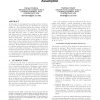Free Online Productivity Tools
i2Speak
i2Symbol
i2OCR
iTex2Img
iWeb2Print
iWeb2Shot
i2Type
iPdf2Split
iPdf2Merge
i2Bopomofo
i2Arabic
i2Style
i2Image
i2PDF
iLatex2Rtf
Sci2ools
110
click to vote
KDD
2002
ACM
2002
ACM
Pattern discovery in sequences under a Markov assumption
In this paper we investigate the general problem of discovering recurrent patterns that are embedded in categorical sequences. An important real-world problem of this nature is motif discovery in DNA sequences. We investigate the fundamental aspects of this data mining problem that can make discovery "easy" or "hard." We present a general framework for characterizing learning in this context by deriving the Bayes error rate for this problem under a Markov assumption. The Bayes error framework demonstrates why certain patterns are much harder to discover than others. It also explains the role of different parameters such as pattern length and pattern frequency in sequential discovery. We demonstrate how the Bayes error can be used to calibrate existing discovery algorithms, providing a lower bound on achievable performance. We discuss a number of fundamental issues that characterize sequential pattern discovery in this context, present a variety of empirical results...
Related Content
| Added | 30 Nov 2009 |
| Updated | 30 Nov 2009 |
| Type | Conference |
| Year | 2002 |
| Where | KDD |
| Authors | Darya Chudova, Padhraic Smyth |
Comments (0)

